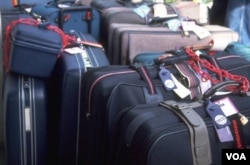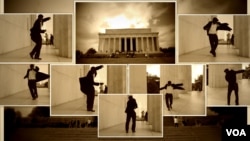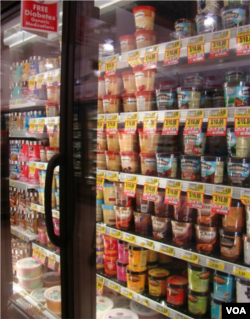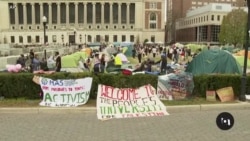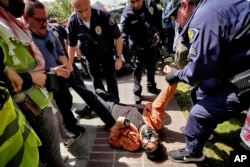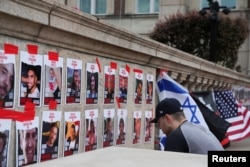Student Union
5 Freshman Mistakes We Made That You Can Avoid
1 Poor packing
We’ve fallen victim to two opposite instincts when it comes to packing for the trip to the U.S.: the desire to bring literally EVERYTHING from home, and the attempt to pack for what we thought America would be like. Both approaches failed.
Tara said her mom tried to overload her suitcases with all of her stuff from back home in China, but when it came down to it, “you can get 80 percent of what you have at home in the US, especially if you live in LA, San Francisco, New York or other cities with ethnic and immigrant communities. However, there did end up being things I couldn’t find in the U.S.”
In particular, she wished she’d brought an electric rice cooker and Chinese spices to cook her favorite foods from home.
Senzeni, on the other hand, cautioned against leaving home without certain clothes, thinking they won’t be in style in America. Not true, she said. You may think college kids only wear jeans and t-shirts, “But pack at least three formal outfits. I had to attend five receptions and dinners in the opening week of freshman year where t-shirts and jeans were a definite no-no.” And prepare for the cold weather, but don’t forget, “When you arrive in August, the weather will be hot and humid and you will love yourself for bringing a tank top and a pair of shorts.”
2 Not getting involved right away
It’s easy, and natural, to feel overwhelmed at the beginning. But give in to that feeling and you’ll only feel more homesick. We’ve found that getting involved in campus life actually helped us get over the anxiety.
Sebastian said he had a difficult time when he first arrived at the University of Kansas. Between moving into a new place, adapting to a new culture, and getting accustomed to new food and weather, “I was too busy to even meet new people. And without people around I got homesick real quick. I missed my family, friends and so many people that it made my whole stay hard for the first week or so.”
“And then I met some Bolivian guys, and then American people too, who made the whole experience different.”
Alex described it like this:
“It’s a mesmerizing experience when you arrive in a new city. It’s a new life, a new culture and a new reality. It has you feeling strange, kind of like a thrilling cocktail of excitement, tension, a bit of loneliness and some insecurity. It’s an unfamiliar territory for most of us and we just don’t know how to deal.
But if we allow ourselves to explore how we feel, we find that involvement is the key. When we start to involve ourselves with the city, the food, the people and the little things, we start to truly appreciate our new home.”
3 Looking the wrong way when crossing the street!
It may seem like a small one, but we’ve almost lost a few bloggers who weren’t sure which way the cars would be coming from. “Yes, I almost got run over by a car, after frantically hopping all over the place and glancing confusedly in all directions like a flying insect under threat,” recalled Simba of his first few weeks at Oberlin College.
If you’re still wondering, look LEFT. In America, cars drive on the right side of the road.
Luckily, in some places cars are more willing to stop and let you cross the road. “I remember when I first came here — I felt like the king of the road for a few seconds, with cars waiting on me to cross,” said Rudro about his experience in Chico, California. Just don’t try that in New York.
4 Overdoing it on American food.
Tara has described food in America as bigger, sweeter and more available than anywhere else. Almost every one of us has found it easy to get sucked in.
When Jihye arrived in Washington, D.C., she was amazed when she went to her first supermarket:
“You can find a whole aisle of ice creams in grocery shopping mall such as Safeway, Harris Teeter, or Target etc. It is so exciting for me to see all different kinds of ice creams. I can find a lot of ice creams in Korea, but not a whole aisle! You can have your time for philosophical speculation (for example, what kind of flavor will make me happy?) while you are walking through the ice cream aisle!”
Promise got over the excitement pretty quickly. Not long into his stay in Minnesota, he discovered, “Ah! I am tired of sandwiches, pizzas, cookies, milk, chocolate, strawberry ice-cream…”
But Tara cautioned, “Around three months after you get to America, you will be totally comfortable with the big portions, and amazed at yourself being able to eat it up effortlessly.”
She wasn’t pleased with that accomplishment.
5 Not seeking out help
Jamal discovered something important during her first week in California, “That is: always ask questions, otherwise you don’t get what you want – or at least, otherwise people won’t know what you want.”
“Two days after leaving my home town I got to my college town of Oceanside, California. I went to International Students’ Office and I met with my counselor and some other staff working there. They were very nice people and they tried to help me in many ways. It’s very important to set up a plan for the first semester, to choose the right classes for your major, and the counselor is always willing to help students with those sorts of things (or even with how to find the right bus).”
No matter what challenges you may face – whether it’s an inability to cross the street or overwhelming homesickness – asking for help can make all the difference.
Did you make mistakes as a first year that you think others should learn from? Share your suggestions in the comments or using the form below!
Loading...
See all News Updates of the Day
- By VOA News
Here’s how Biden’s latest loan-forgiveness plan would work
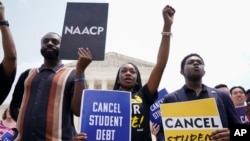
The plan could give as many as 30 million Americans a break, according to Andrew Restuccia and Oyin Adedoyin of The Wall Street Journal. (April 2024)
- By VOA News
What types of graduate student housing are there?
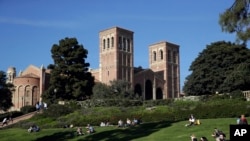
Anayat Durrani of the US News & World Report breaks down the options. (April 2024)
Pro-Palestinian protests spread on US university campuses
U.S. university campuses are seeing pro-Palestinian protests daily. Students are demonstrating against the Israel-Hamas war in Gaza and demanding that humanitarian aid be allowed to flow into the territory. VOA’s Veronica Balderas Iglesias reports.
US police clash with students who demand colleges cut financial ties to Israel
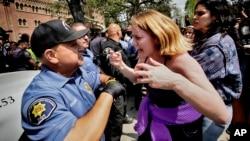
Police tangled with student demonstrators in the U.S. states of Texas and California while new encampments sprouted Wednesday at Harvard and other colleges as school leaders sought ways to defuse a growing wave of pro-Palestinian protests.
At the University of Texas at Austin, hundreds of local and state police — including some on horseback and holding batons — clashed with protesters, pushing them off the campus lawn and at one point sending some tumbling into the street. At least 20 demonstrators were taken into custody at the request of university officials and Texas Governor Greg Abbott, according to the state Department of Public Safety.
A photographer covering the demonstration for Fox 7 Austin was arrested after being caught in a push-and-pull between law enforcement and students, the station confirmed. A longtime Texas journalist was knocked down in the mayhem and could be seen bleeding before police helped him to emergency medical staff who bandaged his head.
At the University of Southern California, police got into a back-and-forth tugging match with protesters over tents, removing several before falling back. At the northern end of California, students were barricaded inside a building for a third day at California State Polytechnic University, Humboldt. The school shut down campus through the weekend and made classes virtual.
Harvard University in Massachusetts had sought to stay ahead of protests this week by limiting access to Harvard Yard and requiring permission for tents and tables. That didn't stop protesters from setting up a camp with 14 tents Wednesday following a rally against the university's suspension of the Harvard Undergraduate Palestine Solidarity Committee.
Students protesting the Israel-Hamas war are demanding schools cut financial ties to Israel and divest from companies enabling its monthslong conflict. Dozens have been arrested on charges of trespassing or disorderly conduct. Some Jewish students say the protests have veered into antisemitism and made them afraid to set foot on campus.
Columbia University averted another confrontation between students and police earlier in the day. The situation there remained tense, with campus officials saying it would continue talks with protesters for another 48 hours.
On a visit to campus, U.S. House Speaker Mike Johnson, a Republican, called on Columbia University President Minouche Shafik to resign "if she cannot bring order to this chaos."
"If this is not contained quickly and if these threats and intimidation are not stopped, there is an appropriate time for the National Guard," he said.
Shafik had set a midnight Tuesday deadline to reach an agreement on clearing an encampment, but the school extended negotiations, saying it was making "important progress."
On Wednesday evening, a Columbia spokesperson said rumors that the university had threatened to bring in the National Guard were unfounded. "Our focus is to restore order, and if we can get there through dialogue, we will," said Ben Chang, Columbia's vice president for communications.
Columbia graduate student Omer Lubaton Granot, who put up pictures of Israeli hostages near the encampment, said he wanted to remind people that there were more than 100 hostages still being held by Hamas.
"I see all the people behind me advocating for human rights," he said. "I don't think they have one word to say about the fact that people their age, that were kidnapped from their homes or from a music festival in Israel, are held by a terror organization."
Harvard law student Tala Alfoqaha, who is Palestinian, said she and other protesters want more transparency from the university.
"My hope is that the Harvard administration listens to what its students have been asking for all year, which is divestment, disclosure and dropping any sort of charges against students," she said.
Columbia encampment inspires others
Police first tried to clear the encampment at Columbia last week, when they arrested more than 100 protesters. The move backfired, acting as an inspiration for other students across the country to set up similar encampments and motivating protesters at Columbia to regroup.
On Wednesday about 60 tents remained at the Columbia encampment, which appeared calm. Security remained tight around campus, with identification required and police setting up metal barricades.
Columbia said it had agreed with protest representatives that only students would remain at the encampment and they would make it welcoming, banning discriminatory or harassing language.
On the University of Minnesota campus, a few dozen students rallied a day after nine protesters were arrested when police took down an encampment in front of the library. U.S. Representative Ilhan Omar, whose daughter was among the demonstrators arrested at Columbia last week, attended a protest later in the day.
A group of more than 80 professors and assistant professors signed a letter Wednesday calling on the university's president and other administrators to drop any charges and to allow future encampments without what they described as police retaliation.
They wrote that they were "horrified that the administration would permit such a clear violation of our students' rights to freely speak out against genocide and ongoing occupation of Palestine."
Netanyahu encourages police response
Israeli Prime Minister Benjamin Netanyahu lashed out at the pro-Palestinian demonstrations on U.S. college campuses in a video statement released Wednesday, saying the response of several university presidents has been "shameful" and calling on state, local and federal officials to intervene.
Students at some protests were hiding their identities and declined to identify themselves to reporters, saying they feared retribution. At an encampment of about 40 tents at the heart of the University of Michigan's campus in Ann Arbor, almost every student wore a mask, which was handed to them when they entered.
The upwelling of demonstrations has left universities struggling to balance campus safety with free speech rights. Many long tolerated the protests, but are now doling out more heavy-handed discipline, citing safety concerns.
At New York University this week, police said 133 protesters were taken into custody and all had been released with summonses to appear in court on disorderly conduct charges. More than 40 protesters were arrested Monday at an encampment at Yale University.
Columbia University demonstrators in talks with administration officials
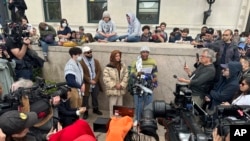
Officials at Columbia University were continuing talks Wednesday with student demonstrators from the Gaza Solidarity Encampment as the protest reaches a full week.
At 9:41 p.m. Tuesday, university President Nemat “Minouche” Shafik sent an email to the Columbia community setting a midnight deadline for an agreement to be reached about dismantling the encampment and dispersing the protesters.
“I very much hope these discussions are successful,” she wrote. “If they are not, we will have to consider alternative options for clearing the West Lawn and restoring calm to campus so that students can complete the term and graduate.”
As midnight passed, Columbia University Apartheid Divest posted a statement on X saying, “We refuse to concede to cowardly threats and blatant intimidation by university administration. We will continue to peacefully protest.”
The statement also said the university had threatened to call the National Guard. But after visiting the university earlier in the week, New York Governor Kathy Hochul said Tuesday she had no plans to deploy the National Guard.
As midnight approached on Tuesday, a student organizer announced that the deadline had been extended to 8 a.m. Wednesday.
At 4:09 a.m., the Office of the President sent an email saying the discussion deadline would be extended for 48 hours, given the constructive dialogue, and the university would report back on progress.
The email announced that leaders of the student encampment had agreed to remove a significant number of tents, get non-Columbia affiliates to leave the encampment and comply with New York Fire Department requirements. They also agreed to ensure that the encampment is “welcome to all” and to prohibit “discriminatory or harassing language.”
This development comes nearly a week after more than 100 students were arrested at the school on April 18, after Shafik authorized police to clear away protesters. Some of the students received suspension notices from the school.
Columbia’s action prompted an onslaught of pro-Palestinian demonstrations at other universities and responses from faculty and politicians.
Students at other campuses, such as Yale, Stanford and New York University, have also rallied around the Palestinian cause, calling for their universities to divest from companies with ties to Israel and for a cease-fire in Gaza. Many also have put up tent encampments on their campuses. About 150 students and faculty were arrested at New York University Monday night.
Columbia also announced Tuesday morning that classes on the Morningside main campus, where the protests are taking place, will be offered in a hybrid format for the remainder of the spring semester. The last day of classes is April 29.




